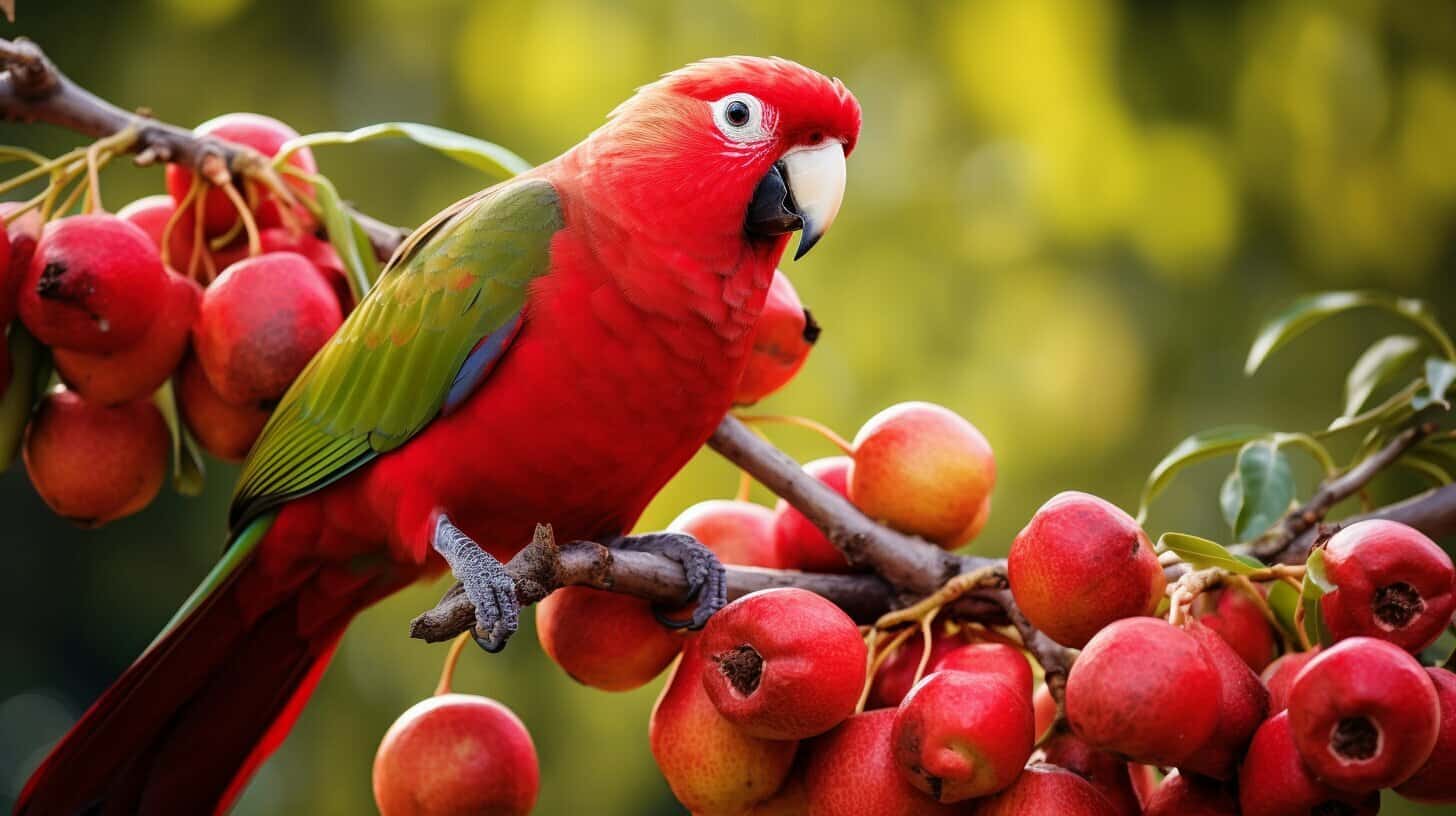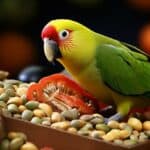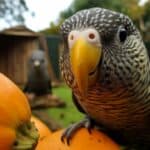If you’re a kakariki owner, you’re probably always looking for ways to keep your feathered friend happy and healthy. While providing a balanced diet is essential, you may be wondering whether pomegranate is safe to add to your bird’s menu. In this guide, we’ll explore the benefits and risks of feeding pomegranate to your kakariki, and provide expert advice on how to do so safely and responsibly.
Can Kakarikis Eat Pomegranate? Yes, kakarikis can eat pomegranates. This fruit forms a beneficial part of their diet, providing essential nutrients such as vitamins and antioxidants. While offering pomegranate to Kakarikis, it’s essential to ensure the fruit is ripe, fresh, and free from any pesticides. The seeds are safe for them to eat but the white pith surrounding them should be avoided as it can be bitter. Portion control is crucial to maintain their overall dietary balance, and the introduction of any new food should be gradual and monitored for any adverse reactions.
Key Takeaways:
- Pomegranate can be a nutritious addition to a kakariki’s diet when introduced gradually and in moderation.
- Feeding pomegranate to your bird may provide additional vitamins, minerals, and antioxidants that support overall health.
- It’s important to monitor your kakariki’s response to pomegranate and consult with an avian veterinarian for personalized advice.
- Other safe fruits for kakarikis include kiwifruit, oranges, and strawberries.
Understanding the Nutritional Benefits of Pomegranate for Kakarikis
If you’re considering incorporating pomegranate into your kakariki’s diet, it’s important to understand the nutritional benefits that this fruit can provide.
Pomegranate is a good source of vitamins C and K, folate, and potassium. Vitamins C and K are essential for maintaining strong bones and healthy blood vessels, while folate is important for cell growth and brain function.
In addition, pomegranate is rich in antioxidants, which can help protect your kakariki’s cells from damage caused by free radicals. Antioxidants are also known to support the immune system, which can help your bird stay healthy and fight off illness.
It’s worth noting that while pomegranate can be a beneficial addition to your kakariki’s diet, it should not be the only source of these important vitamins and minerals. A varied diet is necessary to ensure your bird gets all the nutrients they need to thrive.
Risks Associated with Feeding Pomegranate to Kakarikis
While pomegranate can be a nutritious addition to a kakariki’s diet, it is important to be aware of potential risks and considerations before introducing it to their food regimen.
Allergies: Some birds may have an allergic reaction to pomegranate or other fruits. Observe your kakariki for any signs of itching, redness, or breathing problems after consuming pomegranate.
Digestive Issues: Too much pomegranate or any other fruit can cause digestive issues in birds. Introduce pomegranate gradually and in moderation, and monitor your bird’s stool for any signs of diarrhea or constipation.
Toxicity: While pomegranate itself is not toxic to birds, the seeds can be a choking hazard. Remove all seeds before feeding pomegranate to your Kakariki.
It is always advisable to consult with an avian veterinarian before introducing any new food to your bird’s diet. They can advise you on whether pomegranate is appropriate for your kakariki and offer tips on safe feeding practices.
Safe Fruits for Kakarikis: Alternatives to Pomegranate
If you are hesitant to introduce pomegranate to your kakariki’s diet or want to provide some variety, there are plenty of other fruits that are safe and nutritious for your bird. Here are some options to consider:
| Fruit | Nutritional Benefits |
|---|---|
| Berries (strawberries, raspberries, blueberries) | Rich in antioxidants, vitamin C, and fiber. |
| Apples | High in fiber and vitamin C. |
| Bananas | Contain potassium, vitamin B6, and fiber. |
| Melons (watermelon, cantaloupe) | Low in calories and high in vitamins A and C. |
When introducing new fruits to your kakariki, it is important to do so gradually and in moderation. Start with small amounts and gradually increase as your bird becomes accustomed to the new flavours.
Always wash and prepare fruits before serving them to your bird. Remove any seeds or pits that may be harmful to your bird’s digestive system. Remember to consult with your avian veterinarian for personalized advice on your kakariki’s diet.
Introducing Pomegranate to Your Kakariki’s Diet
If you’re interested in feeding pomegranate to your kakariki, it’s important to do so gradually to prevent any adverse reactions.
Start by offering a small amount of pomegranate, about the size of a pea, and observe your bird’s response. If your kakariki tolerates it well, you can gradually increase the portion size over a week or two.
It’s also recommended that you remove any uneaten pomegranate from your bird’s cage after a few hours to prevent spoilage and bacterial growth.
When preparing pomegranate, make sure to remove the seeds from the white pith and any remaining bits of skin. The seeds can be served raw or slightly smashed to make it easier for your bird to digest.
Tips:
- Introduce pomegranate to your kakariki’s diet gradually, starting with a small amount.
- Observe your bird’s response to the new food and adjust accordingly.
- Remove any uneaten pomegranate after a few hours to prevent spoilage.
- Prepare pomegranate by removing the white pith and skin, and then smash the seeds slightly.
Pomegranate Treats for Kakarikis: Recipes and Dosage
Adding pomegranate to your kakariki’s diet can provide them with essential vitamins and nutrients. And what better way to give them these benefits than through delicious homemade treats? Here are some simple yet tasty recipes to try:
| Recipe | Ingredients | Instructions |
|---|---|---|
| Pomegranate Popsicles | – 1 cup of pomegranate seeds – 1 cup of water – Honey (optional) |
|
| Pomegranate Parfait | – 1 cup of plain yogurt – 1/2 cup of pomegranate seeds – Granola (optional) |
|
Remember to introduce these treats gradually and monitor your kakariki’s response. As with any new food, starting with small portions and observing any signs of allergies or digestive issues is important . Also, keep in mind that treats should make up only a small part of your bird’s diet – the majority of their intake should come from a balanced mix of fruits, vegetables, and essential nutrients. Consult with an avian veterinarian for personalized advice on your kakariki’s diet plan.
Monitoring Your Kakariki’s Response to Pomegranate
As you introduce pomegranates to your kakariki’s diet, monitoring their response closely is important. While pomegranate can provide numerous health benefits, not all birds will tolerate or enjoy it.
Look for any signs of allergies, digestive issues, or unusual behaviour. Symptoms of an allergic reaction may include itching, swelling, difficulty breathing, or diarrhoea. If your bird displays any of these symptoms, stop feeding them pomegranates and consult with your avian veterinarian.
Too much pomegranate can cause digestive issues such as diarrhoea or vomiting. Ensure that you introduce pomegranate gradually and do not feed your bird too much at once. It is also important to remove any uneaten pomegranate to prevent spoilage and the growth of harmful bacteria.
If your kakariki is enjoying pomegranate and experiencing no adverse reactions, you can continue to incorporate it into their diet in moderation. Remember to balance their diet with other fruits and essential nutrients to ensure their overall health and well-being.
Expert Recommended Fruit Diet for Kakarikis
Now that we have explored the benefits and risks of feeding pomegranate to your kakariki, let’s review an expert-recommended fruit diet plan to ensure your bird’s overall health and happiness.
Avian veterinarians suggest a varied diet that includes a mix of fruits, vegetables, and other essential nutrients. Below is an example of a balanced fruit diet for your kakariki:
| Fruit | Serving Size | Frequency |
|---|---|---|
| Kiwi | 1/8 of a kiwi | 2-3 times per week |
| Apple | 1-2 thin slices | 2-3 times per week |
| Pomegranate | 1-2 arils | 1-2 times per week |
| Orange | 1-2 small wedges | 1-2 times per week |
| Grapes | 2-3 grapes | 2-3 times per week |
Remember always to introduce new fruits gradually and observe your bird’s response.
Too much fruit can lead to health problems, so it is important to maintain an appropriate balance and moderation. Consult with your avian veterinarian for personalized advice on your kakariki’s diet.
Conclusion
Now that you have read this guide, you better understand whether pomegranate is a suitable addition to your kakariki’s diet. While pomegranate can provide valuable nutrients and variety to their meals, it is important to introduce it gradually and monitor their response.
Always consult an avian veterinarian for personalized advice on your bird’s diet and nutrition.
By following the recommended fruit diet plan and incorporating a variety of safe fruits, vegetables, and other essential nutrients, you can ensure that your feathered friend stays healthy and happy for years to come.
FAQ
Q: Can kakarikis eat pomegranate?
A: Yes, pomegranate can be included in a kakariki’s diet.
Q: What are the nutritional benefits of pomegranate for kakarikis?
A: Pomegranate is rich in vitamins, minerals, and antioxidants that support a kakariki’s overall health.
Q: Are there any risks associated with feeding pomegranate to kakarikis?
A: While pomegranate is generally safe, it’s important to consider allergies, digestive issues, and the need for moderation.
Q: What are some safe fruits for kakarikis?
A: Other safe fruits for kakarikis include apples, oranges, grapes, and berries.
Q: How should pomegranate be introduced to a kakariki’s diet?
A: Pomegranate should be introduced gradually, and portion sizes and signs of adverse reactions should be monitored.
Q: Are there any pomegranate treat recipes for kakarikis?
A: There are delicious and healthy treat recipes using pomegranate for kakarikis.
Q: How can I monitor my kakariki’s response to pomegranate?
A: Look out for signs of allergies, digestive issues, or any changes in behaviour after introducing pomegranate.
Q: What is the expert recommended fruit diet for kakarikis?
A: An expert-recommended fruit diet plan includes a balanced mix of fruits, vegetables, and essential nutrients.



Have comments or questions about this article? Then get involved!
Spotted an error or something we have missed? Let us know